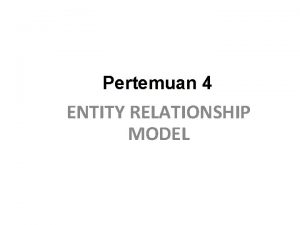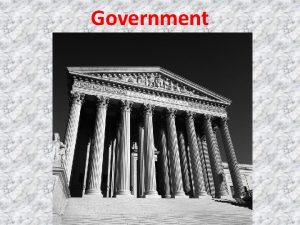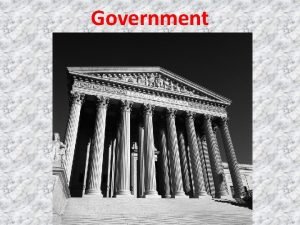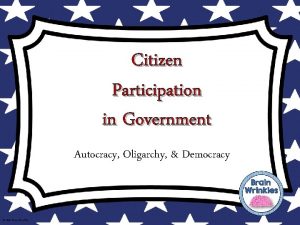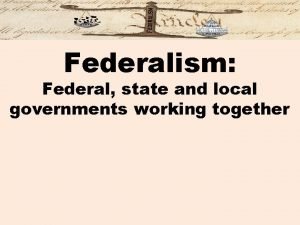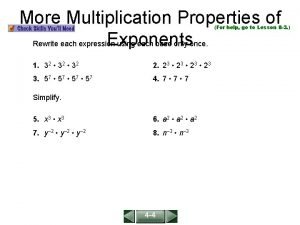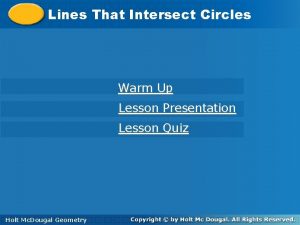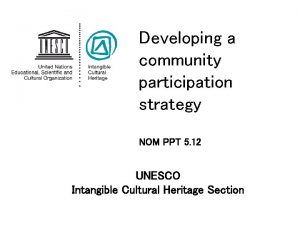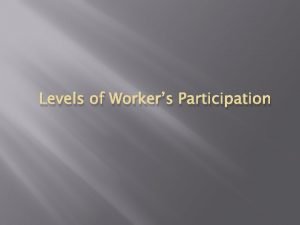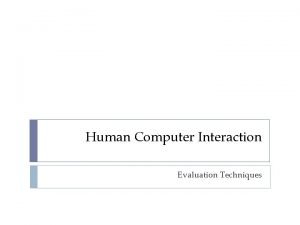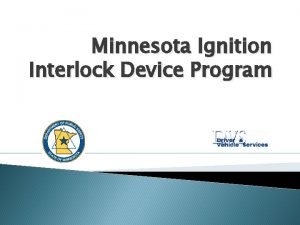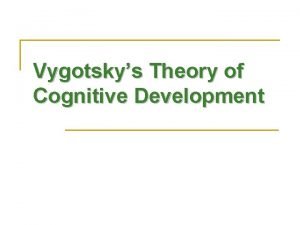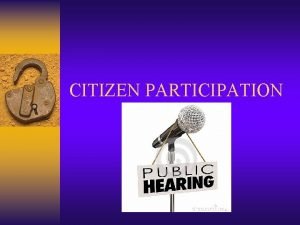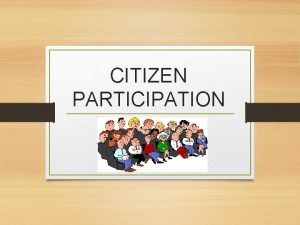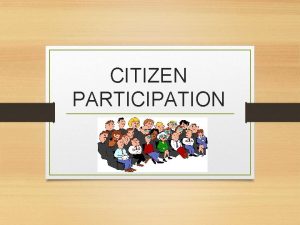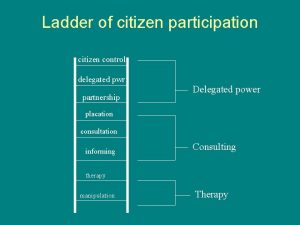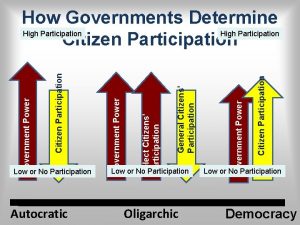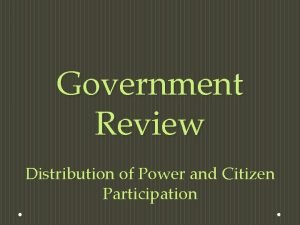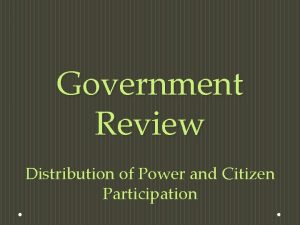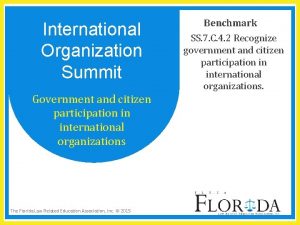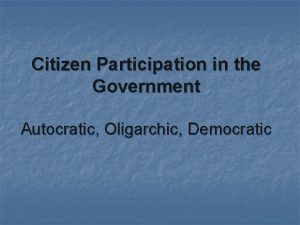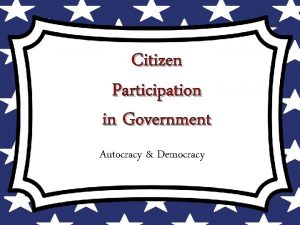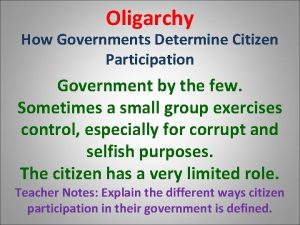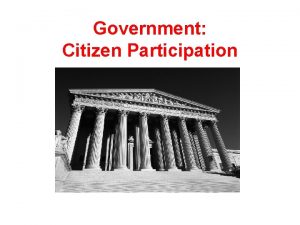Citizen Participation in Government Citizen Participation In each



















- Slides: 19

Citizen Participation in Government

Citizen Participation In each country, the people have different rights to participate in the government In some countries, any citizen can run for office or vote in elections In other countries there are restrictions placed on who can run for office and who can vote There also countries where no citizen can vote and there are no elections

Three Types 1. Types of Government are based on two key questions: 1. Who governs? 2. 2. What is the citizen participation? There are three types of governments: Autocracy, Oligarchy, and Democracy

Autocracy • The oldest form of government. • One of the most common forms of government. • Maintain power through inheritance or ruthless use of military and police power. • Can you think of any governments like this?

Autocratic Governments --Has a single ruler with unlimited power --Citizens have no ability to participate in the selection of the ruler or in the creation of laws --One benefit of this type of government is that decisions for a country can be made quickly However, the needs of the people may be ignored or unheard --The leader may make poor or selfish decisions that hurt the people

Autocracy Generally the power to rule is inherited or by military force. There two main types: dictatorship & absolute monarchy.

1. Dictatorship The leader has not been elected and uses force to control all aspects of social and economic life. Examples: Adolf Hitler in Germany and Joseph Stalin in the Soviet Union

2. Absolute Monarchy A monarchy has a king, queen, emperor or empress. The power is usually inherited or passed down from family members. The monarch has absolute power meaning they can make all decisions without consulting anyone.

Autocracies of the World

Oligarchic Governments --“rule by a few” = country is ruled by a small group of people An advantage is that decisions can be made relatively quickly --Compared to an autocratic system, oligarchies have more heads to think through problems and should make better choices However, the citizen do not participate (some restriction) in the government

Oligarchy --A government in which a few people such as a dominant clan or clique have power. --The group gets their power from either military, wealth, religion, or social status. -- Examples- Communist countries such as China and Cuba --Leaders in the party and armed forces control government.

Democratic Governments --The people are in charge of the government because they can VOTE --Puts the power of the government in the citizens of the country All citizens have the opportunity to be a leader, and all citizens have the opportunity to vote for leaders and laws All citizens are involved in the decision-making process of the government, and all groups are represented --Can be slow to make decisions because all people must discuss & vote on the issues

This is a “Polity Data Series Map” It tries to measure a country’s true democracy in government It gives scores of -10 to +10. The countries in the lightest pink have the highest democracy score, the darker the color, the lower the democracy score

In a Democracy…. --Individual freedom and equality is valued. --Free elections are held --Decisions are based on majority rule. --All candidates can express their views freely. --Citizens vote by secret ballot.

Autocratic Low or No Participation Oligarchic Citizen Participation Government Power General Citizens’ Participation Select Citizens’ Participation Government Power Citizen Participation Government Power How Governments Determine Citizen Participation High Participation Democracy

#3 Constitutional Monarchy Kings, queens or emperors share power with elected legislatures. Generally the Kings are northing more than figureheads. The government is a democratic one that limits the monarchs power. Example: Great Britain

Parliamentary Democracy Voters elect members to the Parliament (legislature) Parliament has two Houses: House of Commons: The Political Party with the most votes in the House of Commons chooses the Prime Minister, the government’s leader with no set length of term. House of Lords: Little power with most members being nobles having inherited their titles

Presidential Democracy Voters elect legislators Voters elect (directly) the president. Therefore, in the presidential system voters have a more direct say about those who serve in two branches of the government : Legislative Executive

Parliamentary System Presidential System Executive Legislative Elect t Ele c Legislative Elec t Select Executive Citizens
 Pengertian lrs
Pengertian lrs Presidential democracy definition
Presidential democracy definition Oligarchy examples
Oligarchy examples Chapter 7 citizen participation in a democracy answers
Chapter 7 citizen participation in a democracy answers Citizen participation in autocracy
Citizen participation in autocracy Oligarchy citizen participation
Oligarchy citizen participation What are the three levels of government
What are the three levels of government 7-3 more multiplication properties of exponents
7-3 more multiplication properties of exponents Identify each line or segment that intersects each circle
Identify each line or segment that intersects each circle Total participation techniques book
Total participation techniques book Banks association of turkey
Banks association of turkey Community participation ppt
Community participation ppt Outstanding participation
Outstanding participation 5 levels of participation
5 levels of participation Cooperative evaluation in hci
Cooperative evaluation in hci Integration continuum for sport participation
Integration continuum for sport participation Mn interlock program
Mn interlock program Modles
Modles Guided participation examples
Guided participation examples Widening participation and spreading excellence
Widening participation and spreading excellence
